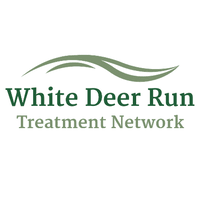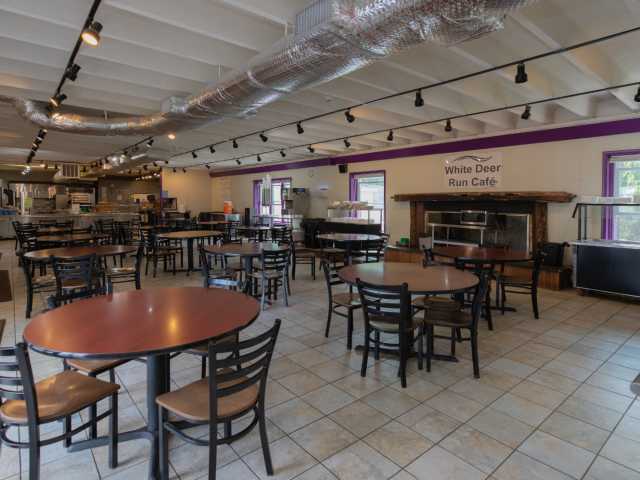Allenwood, Pennsylvania, United States
White Deer Run Allenwood
Claimed
Claimed
Recovery.com has connected directly with this treatment provider to validate the information in their profile.
CARF Accredited
CARF stands for the Commission on Accreditation of Rehabilitation Facilities. It's an independent, non-profit organization that provides accreditation services for a variety of healthcare services. To be accredited means that the program meets their standards for quality, effectiveness, and person-centered care.
Provider's Policy
Please call our admissions team for more information on insurance coverage. A knowledgeable member of our team can answer any financial questions you might have, and they can also reach out directly to your insurance carrier to verify and maximize your benefits. This service is free and puts you under no obligation to choose our programming.
Estimated Cash Pay Rate
The cost listed here ($450/day) is an estimate of the cash pay price. Center pricing can vary based on program and length of stay. Contact the center for more information. Recovery.com strives for price transparency so you can make an informed decision.
About White Deer Run Allenwood
White Deer Run Allenwood is a detox and residential center for men and women located on the hillside of the Bald Eagle State forest. Their program is gender-specific and treats substance use as well as certain co-occurring disorders, including post-traumatic stress disorder (PTSD), bipolar disorder, depression, anxiety, and attention-deficit/hyperactivity disorder (ADHD). White Deer Run provides detox, residential, and telehealth services.
Detox and Residential Programs
Treatment begins with a comprehensive assessment to learn medical and family history, discuss goals, and create a treatment plan. White Deer Run Allenwood offers medically monitored detox and medication-assisted treatment with vivitrol and buprenorphine as needed. In White Deer Run’s residential program, all staff collaborate to create individualized treatment plans for the client. Staff includes psychiatrists, nurses, masters-level therapists and counselors, and social workers. Clients participate in 1:1 therapy twice weekly. White Deer Run includes regular family therapy, or on an as needed basis. White Deer Run’s telehealth program provides evidence-based care 3 days weekly, 3 hours each day.
Well-Rounded Therapies
White Deer Run Allenwood provides therapies such as cognitive behavioral therapy (CBT), dialectical behavioral therapy (DBT), motivational interviewing, rational emotive behavioral therapy (REBT), and choice therapy. Their program is 12-Step based and includes 12-Step meetings and sponsorships. Group therapy can go over topics such as gender-specific issues and relapse prevention. White Deer Run offers specialized anxiety, depression, bipolar disorder, and anger management groups. They also offer life skills development, self-care, and coping strategy building.
Healing in Nature
White Deer Run strives to provide a holistic healing experience and offers on-site experiential therapies 3+ times weekly. These include aromatherapy, meditation, guided imagery, reiki, reflexology, tai chi, yoga, and an outdoor low ropes course. White Deer Run Allenwood has been helping clients heal since 1970. Their campus is located on 150 scenic acres in the mountains, and they take 264 clients at a time. White Deer Run’s Allenwood location has walking trails, a craft room, a ping pong room, a gym, a reiki room, and a meditation room. White Deer Run offers continuing care post-residential treatment, and they start planning for discharge at the beginning of the program. White Deer Run is in the Veteran Affairs Community Care Network.
Read More
Insurance Accepted
Provider's Policy:Please call our admissions team for more information on insurance coverage. A knowledgeable member of our team can answer any financial questions you might have, and they can also reach out directly to your insurance carrier to verify and maximize your benefits. This service is free and puts you under no obligation to choose our programming.
Detox Program
Clients can begin treatment at White Deer Run with medically monitored detox. Their psychiatrists, nurses, masters-level therapists and counselors, and social workers collaborate to conduct an initial physical and psychological assessment to provide the most appropriate support. Clients can participate in medication-assisted treatment with vivitrol and buprenorphine, as needed. This program lasts 3-7 days.
Gender-Specific Programming
White Deer Run Allenwood offers gender-specific programming to address the unique concerns that men and women face in recovery. This allows clients to focus on their recovery needs in a safe, understanding space. Men’s and women’s groups discuss gender-specific struggles, self care, support systems.
Specialized Group Therapy Sessions
White Deer Run Allenwood provides a variety of specialized groups that cover a range of recovery topics. Clients can participate in groups that focus on coping skills, 12-Step recovery, anxiety and depression-specific groups, and education on the disease of addiction. White Deer Run also provides groups that discuss relationships and boundaries, life stressors, life skill development, and value systems.

Center Overview
Estimated Cash Pay Rate
Veterans
Patients who completed active military duty receive specialized treatment focused on trauma, grief, loss, and finding a new work-life balance.

Treatment Focus
This center treats primary substance use disorders and co-occurring mental health conditions. Your treatment plan addresses each condition at once with personalized, compassionate care for comprehensive healing.

Care Options






Treatment
Specializations
Alcohol
Using alcohol as a coping mechanism, or drinking excessively throughout the week, signals an alcohol use disorder.
Anxiety
Anxiety is a common mental health condition that can include excessive worry, panic attacks, physical tension, and increased blood pressure.
Co-Occurring Disorders
A person with multiple mental health diagnoses, such as addiction and depression, has co-occurring disorders also called dual diagnosis.
Cocaine
Cocaine is a stimulant with euphoric effects. Agitation, muscle ticks, psychosis, and heart issues are common symptoms of cocaine abuse.
Depression
Symptoms of depression may include fatigue, a sense of numbness, and loss of interest in activities. This condition can range from mild to severe.
Heroin
Heroin is a highly addictive and illegal opioid. It can cause insomnia, collapsed veins, heart issues, and additional mental health issues.
Opioids
Opioids produce pain-relief and euphoria, which can lead to addiction. This class of drugs includes prescribed medication and the illegal drug heroin.
Residential
In a residential rehab program, patients live onsite, with access to daily treatment and 24-hour care. An average stay is 30-90 days.
Approaches
Experiential
Expressive tools and therapies help patients process past situations, learn more about themselves, and find healing through action.
Individual Treatment
Individual care meets the needs of each patient, using personalized treatment to provide them the most relevant care and greatest chance of success.
Twelve Step
Incorporating spirituality, community, and responsibility, 12-Step philosophies prioritize the guidance of a Higher Power and a continuation of 12-Step practices.
Therapies
1-on-1 Counseling
Patient and therapist meet 1-on-1 to work through difficult emotions and behavioral challenges in a personal, private setting.
Mindfulness Therapy
This ancient practice can be mental, emotional, and even spiritual. In meditation, you focus your attention on the present moment without judgement.
Aromatherapy
Inhaling or topically applying essential oils can help relieve stress, soothe pains, and relieve emotional distress.
Experiential Therapy
With this approach, patients heal by doing. Therapists help patients process difficult emotions to speak, using guided activities like art or dance.
Family Therapy
Family therapy addresses group dynamics within a family system, with a focus on improving communication and interrupting unhealthy relationship patterns.
Life Skills
Teaching life skills like cooking, cleaning, clear communication, and even basic math provides a strong foundation for continued recovery.
Motivational Interviewing and Enhancement Therapy (MET)
This approach is based on idea that motivation to change comes from within. Providers use a conversational framework that may help you commit to recovery.
Reiki
Hand placements or light touches over the body aim to strengthen patients' life energy, guided by a Reiki therapist with expertise in this Eastern medicine.
Twelve Step Facilitation
12-Step groups offer a framework for addiction recovery. Members commit to a higher power, recognize their issues, and support each other in the healing process.
Conditions We Treat
ADHD, ADD
ADHD is a common mental health condition caused by dopamine imbalance. Common symptoms include inattention, hyperactivitiy, and impulsivity.
Anxiety
Anxiety is a common mental health condition that can include excessive worry, panic attacks, physical tension, and increased blood pressure.
Bipolar
This mental health condition is characterized by extreme mood swings between depression, mania, and remission.
Post Traumatic Stress Disorder
PTSD is a long-term mental health issue caused by a disturbing event or events. Symptoms include anxiety, dissociation, flashbacks, and intrusive thoughts.
Substances We Treat
Alcohol
Using alcohol as a coping mechanism, or drinking excessively throughout the week, signals an alcohol use disorder.
Co-Occurring Disorders
A person with multiple mental health diagnoses, such as addiction and depression, has co-occurring disorders also called dual diagnosis.
Cocaine
Cocaine is a stimulant with euphoric effects. Agitation, muscle ticks, psychosis, and heart issues are common symptoms of cocaine abuse.
Drug Addiction
Drug addiction is the excessive and repetitive use of substances, despite harmful consequences to a person's life, health, and relationships.
Heroin
Heroin is a highly addictive and illegal opioid. It can cause insomnia, collapsed veins, heart issues, and additional mental health issues.
Methamphetamine
Methamphetamine, or meth, increases energy, agitation, and paranoia. Long-term use can result in severe physical and mental health issues.
Opioids
Opioids produce pain-relief and euphoria, which can lead to addiction. This class of drugs includes prescribed medication and the illegal drug heroin.
Prescription Drugs
It's possible to abuse any drug, even prescribed ones. If you crave a medication, or regularly take it more than directed, you may have an addiction.
Synthetic Drugs
Synthetic drugs are made in a lab, unlike plant-based drugs like mushrooms. Most synthetic drugs are either stimulants or synthetic cannabinoids.
Experience
Personal Amenities
Amenities
Activities
Yoga
Yoga is both a physical and spiritual practice. It includes a flow of movement, breathing techniques, and meditation.
We love hearing about your treatment experience
Help individuals and families seeking treatment by sharing your first-hand experience with this treatment provider. Review Guidelines.



























